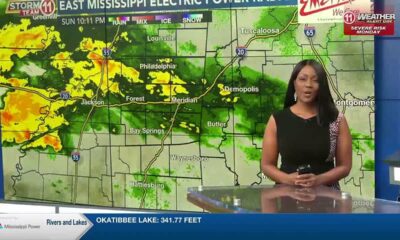Mississippi Today
A survey of surveys in Mississippi

Mississippians love candy corn, they want to buy Nintendo Switch consoles, they don't get enough sleep, they're unlikely to work remotely or try to quit smoking and they have the country's eighth-most beautiful aquarium.
This is the age of the survey, and any reporter's inbox especially around the holidays is likely overflowing with them.
Surveys and polls were once the domain of large companies that specialized in gathering such data from respondents. And the cost and effort involved — thousands of dollars and hours and hours of calling and collecting responses — limited the subject matter and made it easier to reduce inaccuracy or fraud.
But online platforms now allow most anyone to quickly and cheaply conduct an online survey, aggregate data — or fabricate it — and distribute it. These reports often include scant information on how data was collected, margins of error, or about the company or group conducting it.
Many surveys pushed out by marketing or public relations firms are repackaged data collected from the U.S. Census, Centers for Disease Control and Prevention or various government agencies or bureaus.
October, according to National Highway Transportation Safety Administration data, is the most dangerous time to drive in Mississippi. The most dangerous hours to drive are 8 p.m. to 9 p.m., with the safest between 4 a.m. and 5 a.m. Mississippi saw the eighth-highest increase in car crash fatalities from 2012-2021 — a 27.7% increase.
More than 1 in 10 Mississippians avoid visiting a doctor due to health care costs — we're the fourth-worst state, according to CDC data gathered by Wealth of Geeks.
Mississippi has the seventh-shortest wait time in emergency rooms, an average of two hours and nine minutes — 28 minutes less than the national average.
Many surveys are simply rankings of online searches for a particular topic. For instance, a recent “survey” report said Mississippians are among the least likely to quit smoking, based on the number of online searches here on how to quit. Never mind we're one of the least online connected states, according to another survey.
Another surmised that Mississippi has “the lowest interest in learning a new sport,” based on searches. It also reported the most popular new sport in the Magnolia State is pickleball.
Another said the states to which Mississippians most want to move are Texas, Florida and Tennessee, based on Google search data.
Some surveys sound highly questionable if not outright absurd on their face.
Mississippi, according to the Nature and Bloom online CBD store, is the second-most “CBD obsessed” state, behind Alabama.
Mississippi is the state suffering the least from pain, according to a survey from online kratom retailer Happy Go Leafly.
It's the state getting the third-least amount of sleep, based on the number of online searches about melatonin.
Gulfport's Mississippi Aquarium is the eighth-most beautiful in America, based on reviews from visitors that mention beauty. An aquarium in picturesque Detroit was crowned most beautiful.
Mississippians most wanted to buy a Nintendo Switch console for Black Friday and candy corn is their favorite Halloween candy, which is just wrong and gross.
Mississippi has long suffered slings and arrows from surveys and rankings on poverty, obesity, mortality, education — you name it. But in the survey age, there has been better news, whether accurate or dubious.
Mississippi is the best state in which to retire, followed by Alabama and Ohio, one survey reported. It has the lowest number of drunk drivers involved in fatal crashes, according to one survey, and it's the “fifth best state for gamers.”
But one should take note: A Pew Research study suggests opt-in online surveys have 4% to 7% “bogus respondents.” A recent survey of surveys, using a statistical testing method, found that 1 in 5 surveys tested showed a high likelihood of fabricated data.
This article first appeared on Mississippi Today and is republished here under a Creative Commons license.
Mississippi Today
On this day in 1967
MAY 12, 1967

Benjamin Brown, a former civil rights organizer, was shot in the back on this day in Jackson, Mississippi.
Brown had walked with a friend into the Kon-Tiki Café to pick up a sandwich to take home to his wife. On his way back, he encountered a standoff between law enforcement officers and Jackson State University students, who had been hurling rocks and bottles at them. Brown was hit in the back by three shotgun blasts. No arrests were ever made, and the Mississippi Sovereignty Commission gathered spy files on the students who protested.
Eyewitnesses pointed their fingers at then-Mississippi Highway Patrolman Lloyd Jones, who reportedly admitted his involvement in the killing. When some accused a Jackson police detective of killing Brown, Jones was quoted as replying that the detective “didn't shoot that n—–, I did.”
Jones was quoted as saying that he took the shotgun home, cleaned it, wrapped it in a blanket and placed it in an attic for a few months before returning it to service. Jones was never charged and in 1995 was killed while working as sheriff in Simpson County.
This article first appeared on Mississippi Today and is republished here under a Creative Commons license.
Mississippi Today
If you didn’t like MAEP, you may not like the new public school funding formula
House and Senate members often adjourn a legislative day in memory of a constituent or other well known person who recently died.
On the day the Mississippi House took its final vote to adopt a new school funding formula, Rep. Karl Oliver, R-Winona, asked “to adjourn in memory of the Mississippi Adequate Education plan…the failed plan.”
Oliver continued: “It has always failed and never met its expectations. Today we laid it to rest.”
House Speaker Jason White, R-West, gleefully responded that all House members might want to sign onto Oliver's adjourn in memory motion.
Of course, the Senate went on to pass the bill rewriting the Adequate Education Program and Gov. Tate Reeves, a long-time opponent of MAEP, signed the legislation into law this week, no doubt stirring much celebration for folks like Oliver and White.
But for those celebrating the demise of MAEP, be warned with a paraphrased song lyric: Meet the new school funding formula, same as the old school funding formula.
The core principle of the Mississippi Adequate Education Program lives in the new funding formula, named simply the Mississippi Student Funding Formula.
Like MAEP, the new formula uses an objective formula to determine the base student cost (amount of funding per student) and provides that amount of money multiplied by school enrollment or attendance to each local school district.
And here's the kicker: Like MAEP, the Mississippi Student Funding Formula mandates that the Legislature appropriate that amount of money annually to each local district.
The new law states plainly, “Base student cost shall not be lower than the previous year.” So that means the new law mandates lawmaker provide enough funds to pay for what will likely be an ever increasing base student cost or, if they don't want to fully fund education, they have to hope enrollment drops or they simply do like they did with MAEP and not follow the law. The new law does provide a small loophole, saying when a revenue shortfall is so severe that state budgets must be cut, education also can be reduced.
But the new law goes on to say, “If the total revenue increases the following year, the formula shall be recalculated or increased.” Just like MAEP, the amount of money called for by the formula is adjusted yearly for inflation. And it is recalculated every fourth year, meaning unless there are unusual circumstances the formula will generate more money for education each year.
For years, many politicians, including the governor, argued that the state could not afford MAEP's objective funding formula. So, while cutting taxes by more than a billion dollars annually, legislators chose to ignore the law saying MAEP “shall” be fully funded. At the same time those tax cuts were being enacted, many legislative leaders, led by then-Lt Gov. Reeves and former Speaker Philip Gunn, were trying to replace MAEP because they said it was too expensive.
During the 2024 session, new Speaker Jason White and House Education Chair Rob Roberson, R-Starkville, pulling significant help from Reps. Kent McCarty and Jansen Owen, said they wanted to rewrite MAEP not because it sent too much money to the public schools, but because it did not send enough money to poorer school districts. And, granted, the new plan has several features that help poor and at-risk students.
But the House plan, which was nearly identical to a funding formula developed by advocacy groups who support sending public funds to private schools, did not include an objective funding formula. Senate Education Chair Dennis DeBar, R-Leakesville, said it allowed the Legislature to determine “willy nilly” the amount of money to send to public schools.
DeBar and Lt. Gov. Delbert Hosemann were not among the group of legislators who opposed the objective funding formula. A matter of fact, they said they would not agree to rewrite MAEP unless the new method of sending money to public schools also was arrived at objectively. DeBar and Senate staff essentially developed the new objective formula that was placed into the House's formula rewrite.
In the haste and zeal to replace MAEP, politicians who did not like the objective formula agreed to adopt, gulp, a new objective funding formula — one that provides a little less money than MAEP, but still a significant amount and still with a mandate for the Legislature to provide that amount of funds each year.
In a lawsuit challenging the Legislature for not fully funding MAEP, the state Supreme Court ruled in 2017 that “shall” did not actually mean shall. In other words, the justices ruled that legislators did not have to fully fund MAEP even though the law said they “shall” do so.
When and if the new Mississippi Student Funding Formula is not fully funded, maybe the Supreme Court will get another chance to rule on whether legislators have to follow the laws they pass.
This article first appeared on Mississippi Today and is republished here under a Creative Commons license.
Mississippi Today
On this day in 1968
MAY 11, 1968

The Poor People's Campaign arrived in Washington, D.C. A town called “Resurrection City” was erected as a tribute to the slain Martin Luther King Jr.
King had conceived the campaign, which was led by his successor at the head of the Southern Christian Leadership Conference, Ralph David Abernathy. Civil rights leader Jesse Jackson reached out to young Black men wanting vengeance for King's assassination.
“Jackson sat them down and said, ‘This is just not the way, brothers. It's just not the way,”' recalled Lenneal Henderson, then a student at the University of California at Berkeley. “He went further and said, ‘Look, you've got to pledge to me and to yourself that when you go back to wherever you live, before the year is out, you're going to do two things to make a difference in your neighborhood.' It was an impressive moment of leadership.”
This article first appeared on Mississippi Today and is republished here under a Creative Commons license.
-
SuperTalk FM4 days ago
Mississippi governor approves bill allowing electronic search warrants
-
SuperTalk FM6 days ago
Legislation outlawing ‘squatted’ vehicles in Mississippi signed into law
-
228Sports6 days ago
PRC’s Bats Come Alive Late As Blue Devils Beat Picayune To Advance To 6A South State Title Series
-
Mississippi News5 days ago
Strong storms late Wednesday night – Home – WCBI TV
-
Mississippi News4 days ago
Louisville names street after a former high school
-
SuperTalk FM5 days ago
$30 million RV park coming to Natchez features amphitheater, pickle ball courts, and more
-
Mississippi News5 days ago
Crews close Jackson street due to large sinkhole
-
Mississippi Today3 days ago
Lawmakers may have to return to Capitol May 14 to override Gov. Tate Reeves’ potential vetoes






































